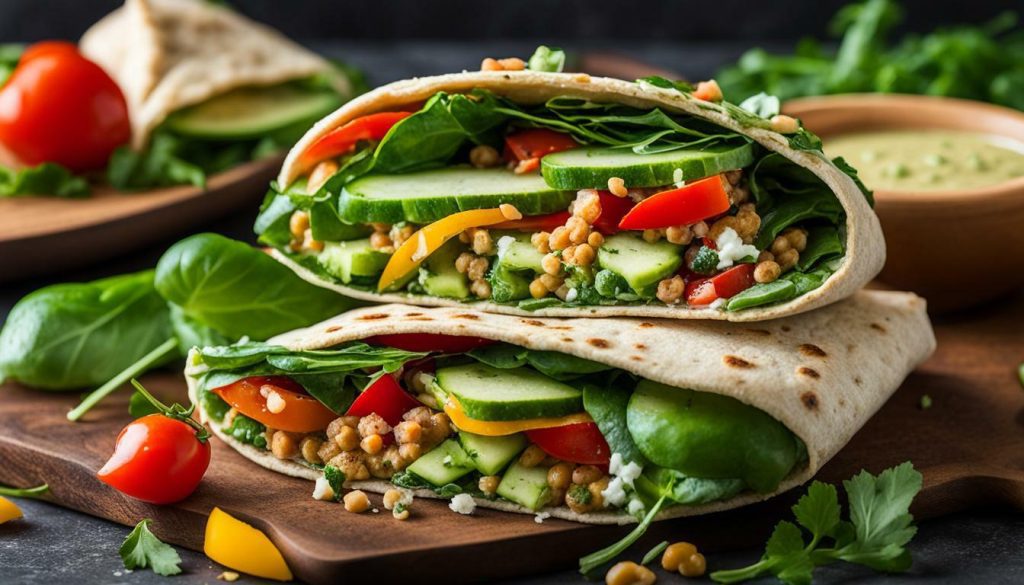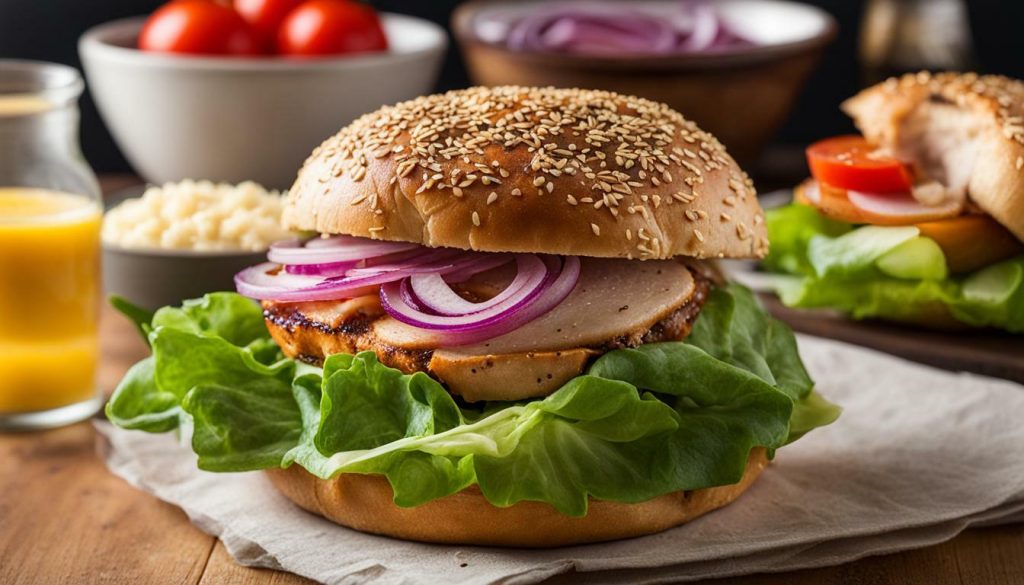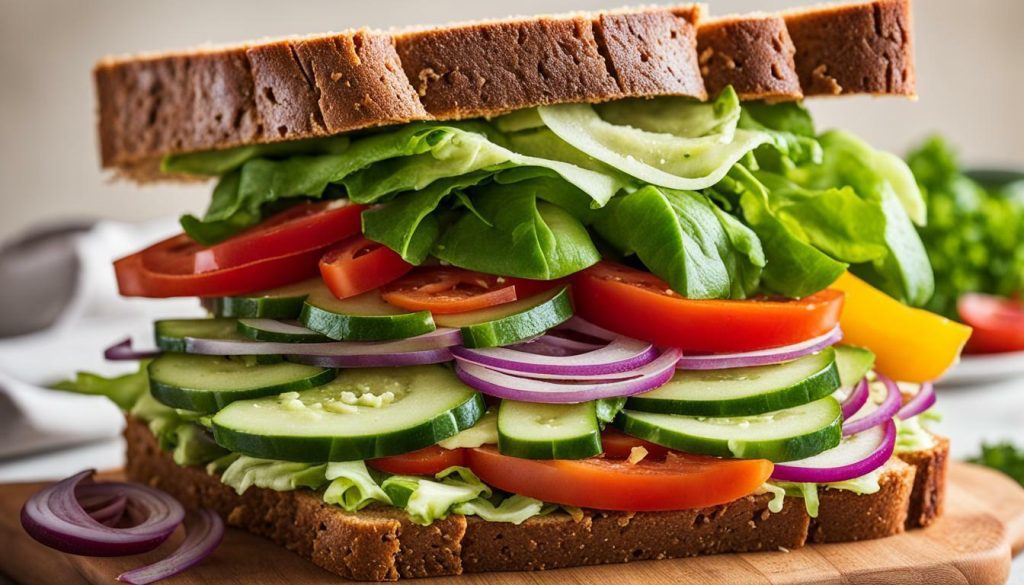
Turkey sandwiches are a popular choice for a quick and convenient lunch, but are they actually good for your health? While they can provide a satisfying meal, it’s important to understand the nutritional values and potential downsides of turkey sandwiches. Let’s explore the truth behind their healthiness and discover ways to make smarter choices for a balanced and nutritious meal.
Key Takeaways:
- Deli turkey, commonly used in turkey sandwiches, is high in protein and contains essential vitamins and minerals.
- However, deli turkey is also high in sodium and saturated fat, which can pose health risks if consumed in excess.
- Processed meats, including deli turkey, have been associated with an increased risk of heart disease, cancer, and diabetes.
- Healthier alternatives to turkey sandwiches include options such as tuna, chicken, or hummus.
- Choosing low-sodium and nitrate-free deli meat, or making your own lunch meat, can help reduce potential health risks.
- Opting for whole-grain or rye bread instead of white bread can provide added nutritional benefits.
- Consider the overall diet and make informed choices to promote a balanced and nutritious meal.
Nutritional Value of Turkey Sandwiches
When it comes to nutritional value, turkey sandwiches offer a range of essential nutrients. Deli turkey is a good source of protein, which plays a crucial role in muscle repair and growth. It also contains vitamins such as niacin, vitamin B6, and vitamin B12, which are important for maintaining overall health.

However, it is important to note that deli turkey is also high in sodium and saturated fat. This can be a concern for individuals who are watching their sodium intake or trying to reduce their saturated fat consumption. Excessive sodium intake has been linked to an increased risk of high blood pressure and heart disease, while high levels of saturated fat can contribute to elevated cholesterol levels.
That being said, there are ways to make turkey sandwiches healthier. One option is to choose low-sodium and nitrate-free deli turkey. Another alternative is to make your own lunch meat using fresh turkey breast, which allows you to control the ingredients and seasoning. Additionally, using whole-grain or rye bread instead of white bread can provide more fiber and nutrients, making the sandwich more nutritious overall.
To summarize, while turkey sandwiches can offer nutritional benefits, it is essential to consider the overall composition of the sandwich and make choices that promote a balanced diet. Incorporating healthier alternatives, such as low-sodium deli meat or homemade turkey breast, and opting for whole-grain bread can help enhance the nutritional value of your sandwich and contribute to a healthier meal.
Health Benefits of Turkey Sandwiches
Beyond just being a tasty meal, turkey sandwiches can offer several health benefits. Turkey is a lean source of protein, which helps with muscle growth and repair. It contains essential amino acids that our bodies need to function properly. Turkey also provides important vitamins and minerals, such as vitamin B6, vitamin B12, zinc, and selenium. These nutrients play a crucial role in supporting our immune system, promoting healthy brain function, and protecting against cell damage.
In addition to its high protein content, turkey is a relatively low-calorie food, making it a suitable choice for those watching their weight. Turkey sandwiches can provide a satisfying meal without adding excessive calories. Pairing your turkey sandwich with whole-grain bread can further enhance its nutritional value. Whole grains are a good source of fiber, which helps regulate digestion and can contribute to a feeling of fullness. They also provide complex carbohydrates, which are a long-lasting source of energy.
To fully enjoy the health benefits of turkey sandwiches, it is important to be mindful of the ingredients used. Opt for whole-grain or rye bread instead of white bread to increase your fiber intake. Choose fresh vegetables as toppings to add extra vitamins and minerals to your sandwich. Consider using avocado or hummus as a spread instead of high-fat mayonnaise. These healthier alternatives not only add flavor but also provide nutrients like healthy fats and fiber.
Table: Nutritional Content of a Typical Turkey Sandwich
| Nutrient | Amount per Serving |
|---|---|
| Protein | 15 grams |
| Fiber | 4 grams |
| Carbohydrates | 25 grams |
| Fat | 10 grams |
| Calcium | 80 milligrams |
| Iron | 2 milligrams |
| Vitamin C | 10 milligrams |
| Vitamin A | 100 international units |
Enjoying a turkey sandwich as part of a balanced diet can be a nutritious and delicious choice. However, it is important to note that individual nutritional needs may vary. It is always recommended to consult with a healthcare professional or registered dietitian for personalized dietary advice.

The Downside of Deli Turkey
While deli turkey has its nutritional benefits, it’s important to be aware of its potential downsides. One significant concern is the high sodium content in deli turkey. A 2-ounce serving of deli turkey can contain up to 500 milligrams of sodium, which is about 20% of the recommended daily intake. Excessive sodium intake can lead to high blood pressure and an increased risk of heart disease. It’s crucial to monitor sodium intake and opt for low-sodium or reduced-sodium deli turkey whenever possible.
Another drawback of deli turkey is its saturated fat content. Although deli turkey is a lean meat, certain varieties may contain added fats or oils to enhance flavor and texture. These additions can increase the saturated fat content, which should be consumed in moderation as part of a healthy diet. High saturated fat intake has been linked to increased cholesterol levels and a higher risk of heart disease.
| Nutrient | Sodium Content | Saturated Fat Content |
|---|---|---|
| Deli Turkey (2-ounce serving) | Up to 500 mg | Varies depending on preparation |
| Recommended Daily Intake | Less than 2,300 mg | Less than 10% of total daily calories |
When choosing deli turkey, it’s essential to read labels and opt for lower sodium and saturated fat options. Look for brands that use minimal additives and preservatives. Additionally, consider making your own lunch meat by roasting a turkey breast and slicing it thinly. This way, you can control the ingredients and reduce sodium and saturated fat levels.

Making Healthier Sandwich Choices
If you’re looking to make your sandwich healthier, there are several alternative options to consider. While turkey sandwiches are a popular choice, they may not always be the most nutritious. Deli turkey, although high in protein and essential nutrients, can also be high in sodium and saturated fat. So, what can you do to create a healthier sandwich without sacrificing taste?
One option is to explore alternatives to deli turkey. Tuna, for instance, is a lean protein source that can be substituted for turkey. Not only is it low in saturated fat, but it also provides omega-3 fatty acids, which are beneficial for heart health. Another alternative is chicken breast. It is lean and packed with protein, making it a nutritious choice for your sandwich. If you prefer a plant-based option, consider using hummus as the main filling. Hummus is rich in protein, fiber, and healthy fats, making it a great choice for vegetarians or those looking to reduce their meat consumption.

When it comes to deli meat, it’s important to read labels and choose options that are lower in sodium and free from additives such as sodium nitrate. Alternatively, you can make your own lunch meat using freshly cooked turkey or chicken breast. By doing so, you have better control over the ingredients and can easily adjust the seasoning to your taste. Alternatively, opt for fresh-sliced deli meat from your local market, which doesn’t contain the same preservatives found in pre-packaged varieties.
Table: Healthier Sandwich Options
| Protein Source | Benefits |
|---|---|
| Tuna | Low in saturated fat, high in omega-3 fatty acids |
| Chicken Breast | Lean protein source |
| Hummus | Plant-based protein, rich in fiber and healthy fats |
Additionally, consider swapping out white bread for whole-grain or rye bread. These options are higher in fiber and offer more nutritional benefits compared to their refined white counterparts. Whole-grain and rye breads can help regulate blood sugar levels, promote digestion, and provide a steady release of energy throughout the day.
Remember, making healthier sandwich choices doesn’t mean compromising on taste. With the right ingredients and a little creativity, you can enjoy a satisfying and nutritious sandwich that will keep you fueled and energized throughout the day.
Low-Calorie Turkey Sandwich Recipes
For those watching their caloric intake, here are some delicious and low-calorie turkey sandwich recipes to try.
Turkey and Veggie Delight:
- Whole-grain bread
- 4 ounces of sliced turkey breast
- Sliced avocado
- Sliced cucumber
- Sliced tomato
- Leafy greens (such as spinach or arugula)
- Mustard or hummus for added flavor
Asian Turkey Wrap:
- Lettuce wrap or whole-grain tortilla
- 4 ounces of sliced turkey breast marinated in low-sodium soy sauce and minced garlic
- Shredded carrots
- Thinly sliced bell peppers
- Sliced green onions
- Cilantro leaves
- Spicy sriracha mayo or peanut sauce for a kick
Cranberry Turkey Panini:
- Whole-grain bread or whole-grain panini roll
- 4 ounces of sliced turkey breast
- Cranberry sauce
- Sliced red onion
- Crumbled feta cheese
- Spinach leaves
- Grill with a panini press for a warm and toasty sandwich
These recipes provide a healthy twist on the classic turkey sandwich by incorporating fresh vegetables, flavorful sauces, and whole-grain bread. They are low in calories but still packed with protein and essential nutrients. Remember to choose lean, low-sodium turkey breast and opt for homemade or fresh-sliced deli meat whenever possible to reduce the intake of preservatives and sodium. Enjoy your low-calorie turkey sandwiches as part of a well-balanced and nutritious diet!

Healthy Sandwich Toppings
Toppings can make or break a sandwich, so here are some healthy alternatives to consider. Instead of high-fat spreads like mayonnaise or butter, try using avocado as a creamy and nutritious option. Avocado is rich in healthy fats, vitamins, and minerals, making it a great choice for adding flavor and texture to your turkey sandwich. You can spread mashed avocado onto your bread or slice it and layer it on top of your turkey.
Another healthy option is mustard, which adds a tangy kick to your sandwich without the added calories or fat. Mustard is low in calories and contains beneficial compounds like antioxidants and minerals. Opt for Dijon or whole grain mustard for an extra flavor boost. You can also experiment with different herbs and spices to create your own unique mustard blend.
If you’re looking for a plant-based alternative, hummus is a delicious and nutritious option. Made from ground chickpeas, tahini, lemon juice, and spices, hummus provides a good source of protein, fiber, and healthy fats. Spread a generous dollop of hummus on your bread and top it with your favorite vegetables for a satisfying and wholesome sandwich.
| Topping | Nutritional Benefits |
|---|---|
| Avocado | Rich in healthy fats, vitamins, and minerals |
| Mustard | Low in calories, contains antioxidants and minerals |
| Hummus | Good source of protein, fiber, and healthy fats |
For added crunch and freshness, consider adding a variety of vegetables to your turkey sandwich. Sliced tomatoes, cucumbers, lettuce, and sprouts can provide a burst of flavor and additional nutrients. You can also experiment with pickled vegetables like thinly sliced red onions or carrots for a tangy twist. Remember to choose whole-grain or rye bread to further enhance the nutritional value of your sandwich.
By making thoughtful choices when it comes to sandwich toppings, you can transform a simple turkey sandwich into a wholesome and satisfying meal. Whether you opt for creamy avocado, tangy mustard, or flavorful hummus, these healthy alternatives will add deliciousness and nutrition to your lunchtime staple.

The Benefits of Whole-Grain or Rye Bread
When it comes to bread for your turkey sandwich, opting for whole-grain or rye varieties can provide additional nutritional benefits. Whole-grain bread is made from whole wheat kernels that retain their bran, germ, and endosperm, which are rich in essential nutrients like fiber, B vitamins, and minerals. Rye bread, on the other hand, is made from rye flour, which offers its own unique set of health advantages.
Whole-grain bread is an excellent source of dietary fiber, promoting healthy digestion and helping to maintain a feeling of fullness. It can also help regulate blood sugar levels and lower the risk of chronic diseases such as heart disease and type 2 diabetes. Rye bread, known for its slightly sour taste, is packed with nutrients like manganese, magnesium, and phosphorus, which contribute to bone health and energy production in the body.
Adding whole-grain or rye bread to your turkey sandwich not only enhances the taste and texture but also increases its nutritional value. The fiber in whole-grain bread aids in digestion and can help prevent constipation. Additionally, the inclusion of whole grains in your diet has been associated with a reduced risk of obesity and improved weight management. Rye bread’s unique flavor profile adds a delicious twist to your sandwich, while its nutrient content provides numerous health benefits.

Opting for whole-grain or rye bread for your turkey sandwich is a simple way to make a healthier choice. The added fiber, vitamins, and minerals in these bread varieties contribute to overall well-being and can help you maintain a balanced and nutritious diet.
Comparison of Whole-Grain and Rye Bread
| Nutrient | Whole-Grain Bread (1 slice) | Rye Bread (1 slice) |
|---|---|---|
| Fiber (g) | 2.7 | 1.9 |
| Protein (g) | 3.9 | 3.6 |
| Iron (mg) | 0.9 | 0.8 |
| Magnesium (mg) | 24 | 19 |
| Phosphorus (mg) | 68 | 57 |
Source: USDA National Nutrient Database for Standard Reference
In conclusion, choosing whole-grain or rye bread for your turkey sandwich can provide additional nutritional benefits. These bread varieties offer a range of nutrients, including fiber, vitamins, and minerals, that support overall health and well-being. The added fiber in whole-grain bread aids in digestion and can contribute to weight management, while the unique flavor and nutrient content of rye bread make it a tasty and nutritious option. So, next time you’re making a turkey sandwich, consider using whole-grain or rye bread to boost its nutritional value and add a delicious twist.
Conclusion
In conclusion, while turkey sandwiches can be a convenient and tasty option, it’s essential to approach them in a way that promotes overall health and well-being. Turkey meat itself is a good source of protein, vitamins, and minerals. However, deli turkey often contains high levels of sodium and saturated fat, which can have negative effects on cardiovascular health. Processed meats, including deli turkey, have also been associated with an increased risk of heart disease, cancer, and diabetes due to their sodium content and the presence of preservatives.
It is recommended to consume turkey sandwiches in moderation and opt for healthier alternatives whenever possible. Tuna, chicken, or hummus are great options that offer similar convenience with potentially lower sodium and fat content. When selecting deli meat, look for low-sodium and nitrate-free options, or consider making your own lunch meat or choosing fresh-sliced deli meat for better control over ingredients.
Another aspect to consider is the choice of bread. Whole-grain or rye breads provide higher fiber and nutrient content compared to white bread, which can contribute to a healthier meal overall. By making these simple swaps and exploring other healthy lunch ideas, it is possible to enjoy delicious sandwiches while maintaining a balanced and nutritious diet.
FAQ
Are turkey sandwiches healthy?
Turkey sandwiches can be a convenient and tasty lunch option, but they may not be the healthiest choice. While deli turkey is high in protein and contains beneficial vitamins and minerals, it is also high in sodium and saturated fat. Consuming processed meats, including cold cuts like deli turkey, has been linked to an increased risk of heart disease, cancer, and diabetes due to their high sodium content. It is recommended to consume turkey sandwiches in moderation and consider healthier alternatives.
What is the nutritional value of turkey sandwiches?
Turkey sandwiches offer a good source of protein, vitamins, and minerals. Deli turkey is high in protein, which aids in muscle growth and repair. It also contains beneficial nutrients like vitamin B6, vitamin B12, iron, and zinc. However, deli turkey is also high in sodium and saturated fat, which should be consumed in moderation for a healthy diet.
What are the health benefits of turkey sandwiches?
Turkey sandwiches can provide benefits such as protein for muscle growth and repair, as well as essential vitamins and minerals for overall well-being. However, it is important to consider the overall nutritional value of the sandwich and make informed choices to promote a balanced and nutritious meal.
What are the downsides of deli turkey?
Deli turkey is high in sodium and saturated fat, which can contribute to health issues such as heart disease, cancer, and diabetes when consumed in excess. Processed meats like deli turkey often contain preservatives such as sodium nitrate, which may produce carcinogenic compounds. It is best to consume deli turkey in moderation and choose lower sodium and nitrate-free options when possible.
What are some healthier sandwich choices?
If you are looking for healthier alternatives to turkey sandwiches, consider options such as tuna, chicken, or hummus. These alternatives offer similar convenience while potentially having lower sodium and fat content. Making your own lunch meat or selecting fresh-sliced deli meat can also be healthier choices as you have better control over ingredients. Using whole-grain or rye bread instead of white bread can provide additional nutritional benefits.
Are there any low-calorie turkey sandwich recipes?
Yes! There are various low-calorie turkey sandwich recipes available that can be enjoyed as part of a balanced diet. These recipes often incorporate fresh vegetables, lean turkey, and whole-grain bread to create a nutritious and satisfying meal. Experiment with different ingredients and flavors to find the perfect low-calorie turkey sandwich recipe for you.
What are some healthy sandwich toppings?
When it comes to healthy sandwich toppings, consider alternatives to high-fat spreads and dressings. Options like avocado, mustard, or hummus can add flavor without the extra calories. These toppings provide healthy fats and other beneficial nutrients that contribute to overall health and well-being.
What are the benefits of whole-grain or rye bread?
Whole-grain or rye bread offers advantages over white bread when it comes to a turkey sandwich. These options typically have higher fiber and nutrient content, which can contribute to a healthier meal. Incorporating whole-grain or rye bread into your sandwich can provide additional nutritional benefits and support overall well-being.
What should I keep in mind when considering turkey sandwiches in my diet?
When considering turkey sandwiches in your diet, it is important to remember that they should be consumed in moderation. The overall diet should be balanced and include a variety of nutritious foods. It is also recommended to choose lower sodium and nitrate-free deli meats, make your own lunch meat, or opt for fresh-sliced deli meat. Focus on incorporating fresh vegetables, lean proteins, and whole grains to create a healthy and satisfying meal.




